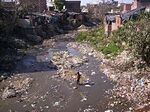Tubevillia
Tubevillia is a town in Crown Royale County, Oklahoma. The population was 2,456 at the (2000 census), though much lower after the 2007 Arkansas-Pacific Rail disaster.
Geography[edit]
Tubevillia is located at 34.28.56N 99.54.77W
According to the United States Census Bureau, the city has a total area of 2.4 square miles (6.2 km2), of which, 8.1 square miles (21 km2) of it is land and 0.2 square miles (0.52 km2) of it (2.75%) is water.
Note: After the 2008 disaster much of the water supply in Tubevillia is undrinkable. Tubevillia is now the largest Superfund site in the United States.
Demographics[edit]
As of the Census in 2000 the population was 2,456 people and 118 families residing in the city. The population density is unimportant as it is likely to have changed after the 2005 Arkansas-Pacific Rail Disaster. The Racial make-up of the city is 84% Colored, 16% Mexican, 8% Indian and 3% Gypsy. For every 100 females there are 54 males. The average female produces 4.7 offspring annually.
Note: Many of the Gypsies were exterminated during the Great Second Dustbowl of 1948–1952. Their sudden appearance (Many of them refuges of the horrors of the Holocaust, inflicted upon Gypsies, Jews and others considered racially or socially inferior in the Nazi Death Camps), coinciding with unprecedented crop failures aroused the suspicions of the townspeople from neighboring Armageddon, OK (Birthplace of Bob Ross, author of The Joy of Painting an Autobiography). They considered them pariahs bringing great misfortune upon the land. The Gypsies were horribly persecuted and lynchings were commonplace. Things soon got out of hand and Governor Archie Long called in reinforcements from the 162d Missouri Light Dragoons, commanded by General Jefferson Pickering.
Pickering and his Division surrounded the town on the morning of June 12, 1952. He rode his steed to the top of Mount Megiddo where he delivered his famous speech: "Fear not good people of Armageddon, we shall smite this Gypsy scourge and drive them from your land. We will stop at nothing but their complete annihilation, when we have finished our grim work today, the only place the Gypsy language shall be heard, will be in Hell!" Hearing this the Armageddians let loose a mighty battle cry, "Death to the Gypsy Horde!" After an 8 hour artillery barrage, Pickering and his army of 8,000 of the finest Heavy Calvary and 2000 Foot Soldiers stormed the town, killing every living creature, man, woman, and child. Not even the Beasts of the Field were spared. When the battle was over only a handful of Gypsies, who were not in town at the time managed to escape to neighboring Lowtown. The Generals wrath was so great, that before his army departed he ordered that the ground "Be sown with salt, that nothing may exist in this place for 1000 years!"
After the battle of Armageddon, The 162d Dragoons were given a Valorious Unit Citation by President Roosevelt. Gen. Pickering was Posthumously awarded the Medal of Honor for his bravery. The town of Armageddon was to know peace and prosperity for the next fifty years.
Arkansas-Pacific Rail disaster of 2005[edit]
On April 1, 2006, an Arkansas-Pacific freight train hauling nearly 22,000 M3 of deadly methyl isocyanate derailed, killing nearly two-thirds of the town's roughly 2,500 residents. The cause of the derailment remains a mystery, though conspiracy theories abound. A congressional investigation found no evidence of foul play and, in his weekly radio address, former President Bush expressed, "Deep Sympathy for all those Coloreds and Mexicans and their families; I haven't quite made up my mind about the Gypsies though."
Initial response didn't arrive until the following day as emergency workers in Armageddon dismissed the disaster as "an April Fool's Day joke." Armageddon's Emergency Response Coordinator, Armond Callanbach, stated, "It is likely that assistance would have proved futile in any event due to the extremely toxic nature of methyl isocyanate and (our) inadequate resources to cope with a disaster on a large scale." The disaster was eventually classified as an "Act of God."
Conspiracy theories[edit]
Several theories surround the Disaster of 2004. The most plausible is that it really was an April Fools Day joke. However, the ARCEMCO conspiracy has caused citizens to petition the Justice Department to reinvestigate the case.
On March 31, 2004, roughly 250 eyewitnesses, including the Chief of Police Hiram Freeman and Fire Chief Sugar Ray Lemons along with a television news crew, witnessed what appeared to be roughly twenty Mexicans removing two sections of track and associated sleepers near Ground Zero of the disaster site. Furthermore, once the track was taken away, a steam shovel was employed to remove the crushed stone ballast bed. When questioned about the film, White House Spokesman Hel Netherbrook, speaking on behalf of Congressman Neville Sheehan (R-KS), who headed up the investigation into the Tubevillia accident, said, "So What? You got a bunch of Mexicans Digging up a railroad track. That could have been filmed anywhere. And do you expect Mr. Sheehan to believe some guy named Sugar Ray?"
Petitioners pointed out that R. Harlon Ross, head of the Farmers' Guild in Armageddon, had taken out a full page ad two weeks earlier in the Tubevillia Chronical, warning the residents to "Send those damned Gypsies back to Mexico or your town will pay!" Mr. Ross's secretary, Sandra Gates, said in a prepared statement that he was just warning those Negroes in Tubevillia that, "If they didn't send them Gypsies packing they would pay a high price." Ms. Gates also added, "In hindsight, Mr. Ross's advice could have saved many lives. This was God's way of punishing the evildoers for harboring sorcerers and practitioners of the black arts."
Noted troublemaker Ellen Brokovich, in one of her many onerous and farfetched reports, stated that many of the farmers in Crown Royale and neighboring Broom Counties had been experiencing lower than expected crop yields in recent years. She also states that the Gypsy residents had been receiving death threats from farmers, warning them to "Leave town or else!". Recent soil analysis has shown, however, that abnormally high levels of sodium and potassium chloride (Rock Salt) in the soil are responsible for reduced harvests. Proving once and for all that Ms. Brokovich's meritless attacks on Mr. Ross and the Farmers' Guild are nothing more than a ploy to garner the publicity and attention she so desires.
Diet[edit]
Varied: Coloreds eat mostly melon, chicken and pork products, Mexicans – beans, tortillas, rice, Indians – probably the same as the Mexicans, although it has been speculated that slash and burn agriculture is still in use (by the Indians) and the cultivation of maize thought long extinct may be commonplace. This has prompted the USDA to provide $50,000,000 in grants to search for the "lost seeds", although there is absolutely no evidence to support this. Gypsies mainly forage in the local landfill, mimicking their ancestors dwelling in the Carpathian Mountains of Transylvania, a hunter gathering society.
Entertainment[edit]
Several forms of amusement are offered in Tubevillia: Notably the annual Gypsy Pow-Wow, and tours of the Kenny Rogers enclosure. Bear Baiting, Dog Fighting and Drinking Games are also popular.
References[edit]
- Oxford English Dictionary 2nd Edition 1989. "Gipsy, gypsy, n."
- Hancock, Ian The ‘Gypsy’ stereotype and the sexualization of Romani women
- Homebrewing For Dummies - Google Book Search". books.google.co.uk. http://books.google.co.uk/books?id=ZjSKh24ZN9kC&pg=PA64&dq=ale+lager+fermenting+temperature&as_brr=3.
- Ostergaard, S., Olsson, L., Nielsen, J., Metabolic Engineering of Saccharomyces cerevisiae, Microbiol. Mol. Biol. Rev. 2000 64: 34-50
- Stahl, George, E. (1730). Philosophical Principles of Universal Chemistry. London.
- Science and Civilisation in China, by Joseph Needham, page 47.[1] Published by Cambridge University Press, 1980.
- ↑ Note that, to obtain page 47, one generally has to purchase the entire book.
Further Reading[edit]
- The Joy of Painting an Autobiography. R. Ross. Harvard University Press, 2008.
- Enduring football anthem World In Motion could be recorded once more - complete with a rap by soccer legend John Barnes.
- Kenny Rogers



